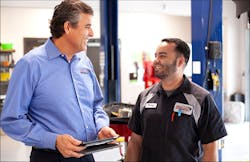SHOP STATS: SCHERTZ AUTO SERVICE Location: SCHERTZ, TEXAS. Operator: Mark Roberts Average Monthly Car Count: 600 (130-150 are state inspections) Staff Size: 12 Shop Size: 5,800 sq ft; Annual Revenue: $2.1
Every single staff member of Schertz Auto Service in Schertz, Texas, volunteered to play a part in a music video filmed at the shop. The idea, owner Mark Roberts says, was inspired by his service advisor, Wayne Whitworth, who wrote an auto repair-themed version of Bon Jovi’s “Wanted Dead or Alive”—a song that was stuck in his head often throughout the day—that Wayne called “I’m a Car Guy.”
In the video, staff members belt out the lyrics and can be seen tending to different elements of the business: working on cars, answering phones, and assisting one another.
Whitworth laughs when he’s asked about the video. Following a Christmas party where he wrote a shop-themed poem of “A Night Before Christmas,” Roberts asked if he planned on doing the same thing this year.
“‘I have a crazier idea I want to run by you,’” Whitworth recalls asking Roberts. “No sooner than I finished the last sentence had he said, ‘Do it.’”
Roberts isn’t surprised that his staff members wanted to participate in the video—his team is dedicated to the craft and to each other.
“I have never lost a technician to another job,” Roberts says.
Prior to the creation of “I’m a Car Guy,” Whitworth penned an op-ed for repair shops on the power of empowerment:
“Imagine a dynamic within an automotive repair facility where workers at the front desk have the authority to solve 99 percent of any issues that may arise, the technicians have a ‘whatever-it-takes’ attitude, customer service is absolutely everything, and hands-on micro-management is unheard of,” Whitworth wrote. “There is such a place located just north of San Antonio named Schertz Auto Service.”
The shop is something special, Whitworth notes, as the overall employee attitude is to do whatever to improve the business.
“The culture is based on the fact that it really is a team,” Whitworth says.
Bringing the Shop to Life
While Roberts operates as an offsite owner today, he has two on-site business partners who share the same belief as Roberts: Company culture is important.
Roberts felt a push to make two staff members—John Long and Dave Bacek—partners in the business as the company grew. In Robert’s career, the opportunity to hold the title “owner,” was something he had previously wanted when he was in their shoes.
“I worked very hard and treated the business like it was mine and it wasn’t,” Roberts recalls. “The owner always told me nobody would ever own any part of the business, and if I owned just a small part than I would [have been] happy.”
Inspired to offer up the opportunity he never received, he began to craft plans for ownership. In 2015, Roberts created a plan where both could buy into the business and own 20 percent of the company.
“We came up with a 10-year plan for them before [they] invested, and the plan is for me to exit at some point,” Roberts says.
Long started in 2005 and worked in both the business’ prior body shop and also the mechanical shop.
“I kind of always ran the day-to-day side of the mechanical [business] even as a service advisor before I came on as a part-owner,” Long says.
Long and Bacek officially became part-owners in 2017.
“In all reality, it didn’t hardly change my outlook at all,” Long says. “David and I kind of grew up running the business together; we always looked at it as our own even though we weren’t officially owners.”
Making both Long and Bacek partners was an easy, smart decision for the business, Roberts says.
“They’re definitely talented people,” he says. “They run all day-to-day operations and have full authority to do what they need to do.”
Although one reason Roberts got into business was to work in a set shop, he ultimately realized the importance of creating a culture that welcomes opportunity, unity, and is ultimately a comfortable place at which to work.
Giving Staff the Torch
At Schertz Auto Service, Roberts’ business puts an emphasis on employees making decisions. While it seems easy, it’s a challenge that the staff has watched employees deal with and come out stronger in the end.
“The shop is constantly evolving and willing to listen and act upon suggestions for improvement,” Whitworth says. “We’re flexible but not limp. The reason this works is because we hire the right people, and management monitors, but does not intrude.”
According to Long, he initially saw decision-making hesitation from Whitworth, but with coaching, Whitworth has grown into a strong leader and helped build an even stronger team, as a result.
“Wayne worked at a few other shops before he came to us, and it took him awhile to buy into how we do things over here, and now he bought in,” Long says. “We just try to empower our employees to do what is right.”
It’s a different mindset to be able to make decisions on your own as an employee, Whitworth admits. When dealing with a customer, the freedom allows staff to focus on the customer’s needs and not second-guess their approach because they don’t know how management would react.
“I can stay focused on what the customer is saying and what it takes to fix it,” Whitworth says.
The business pushes for outside effort and trusts employees to do work that the company can be proud of.
“We want [employees] to make decisions and it just carries down what it takes to make decisions,” Roberts says. “We have guidelines, rules, and policies, [but] you’re still going to have stuff that doesn’t fit that.”
Employees come before the customers, Roberts says. When employees are happy, the work they produce will, in effect, create a happy customer.
Diminishing Shop Competition
Flat rate isn’t for his shop, Roberts says, and as a result, his employees get along.
“Everybody gets along very well because we don’t pay flat rate,” Roberts says. “I believe that’s an outdated system and I don’t think it’s the best for the customer. We don’t have the competitiveness of flagging hours.”
Flat rate can pose issues that are out of the technicians’ hands, Roberts says.
“It’s hard for people to budget when their pay is going up and down, [and] I just never liked it,” Roberts says. “I like consistency, and I think most people like consistency, especially when it comes to pay.”
In Whitworth’s article, he wrote that he believes flat rate’s competitive goal can become an issue for shops.
“Many managers/owners believe that competition between workers will increase productivity and therefore increase profits. This is not necessarily true,” Whitworth wrote. “The right people don’t need short-term games or contests.”
Roberts wants his employees to know that they’re taken care of while they’re working for the company. When employed with the shop, employees receive benefits such as 401(k) and health insurance, as well as uniforms.
In addition to benefits, the shop focuses on an hourly payment plan for technicians, which has been successful for the shop’s growth and overall staff comradery.
“Everybody works together,” Long says. “[The pay scale] helps breed comradery.”
Blending Personal and Professional Lives
Employees’ personal lives aren’t paused the moment they walk into the door, and Roberts recognizes that. Roberts is extremely family-oriented, he says, and has never wanted to have a business that takes away from family time.
“I do not want to create all of this stuff if that’s taking these guys out of their homes,” Roberts says. “I want them with their families—I’m probably overprotective.”
While the shop can be busy at times, Roberts pushes to have employees leave the shop at the same time everyday, and encourages staff members to not put work over family events.
“Anytime my kids were doing something, I was always so grateful that I had staff in place so I could take off,” he says. “I don’t want anybody that works for me to not have the opportunity to go [and] participate in something that their children are doing because it’s during the day.”
Consistency is common practice around the shop. When employees head into work for the day, they know one thing for sure: The shop closes at 5:30 p.m. and they’re not allowed to stay any later.
Every Wednesday, Long cooks the staff lunch and when it’s someone’s birthday, the shop celebrates it.
“It’s a culture and everybody gets along well,” Roberts says.



